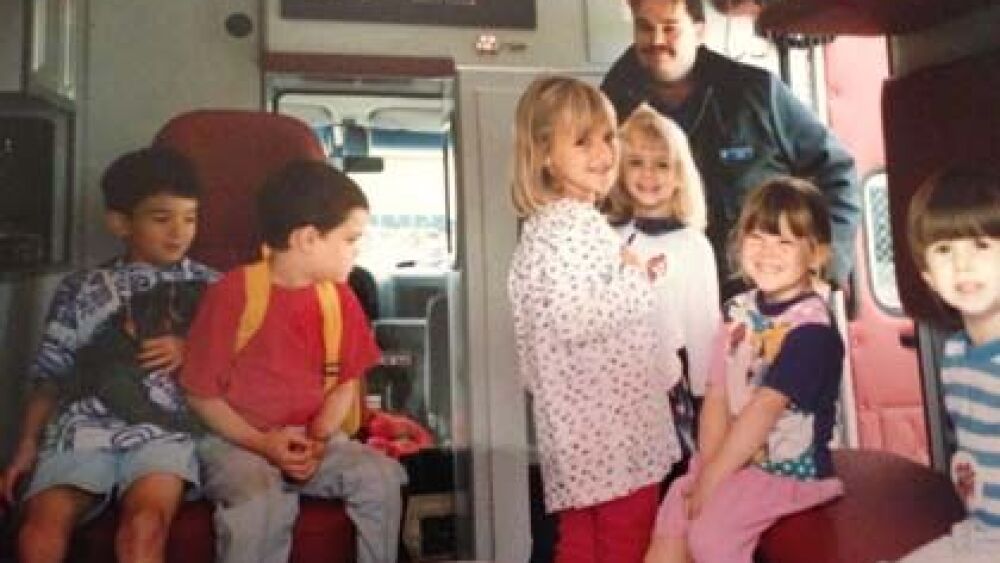Growing up, the only bumper sticker allowed on my dad’s truck was his Texas Paramedic patch.
It was a rule I never understood, but begrudgingly learned to accept. As I saw the “My Kid is an Honor Student” stickers consistently go untouched on the kitchen counter, I stopped bringing them home. When it came time for high school extracurricular activities and club sports, I never even bothered to buy their respective window adhesive displays of parental pride.
I hated that damn paramedic sticker.
My dad’s been a paramedic since before I was born. When he was in high school he wanted to help the Red Cross, so he was given two options: make sandwiches or take a one-day first aid course. He’s been hooked ever since.
Growing up with an ambulance outside the house, I accepted the concept of EMS as part of my reality. Sometimes that meant celebrating Christmas morning at 3 p.m., other times it meant missed sporting events and a single parent cheer squad.
But it also meant that I had the coolest show-and-tell since I got to bring an ambulance to school. It meant for career day, while the other parents talked about working in Houston’s space or oil and gas industries, my father talked proudly about something he wasn’t even paid to do.
I idolized him, despite the sticker, and his commitment to serving others. So I followed in his footsteps and took an EMT-Basic course my freshmen year of college. Like half of my friends, I wanted to go to medical school and this course served two purposes: building my resume and calming my curiosity.
Being in EMS was everything I imagined: lights, sirens, blood and drama. All in one neat 12-hour package.
I started riding at night because that’s what my dad had done. I kept riding under the moonlight because I learned to appreciate the providers and patients I met during the city’s darkest hours.
Unsurprisingly, I fell for one paramedic in particular. He was quiet, yet self-assured; willing to take the time to explain simple concepts to an overly curious volunteer. He was the opposite that I needed.
One of his first calls was an amputation on the backroads of rural Ohio. A decade later, he moved to New Orleans and six months after that the city was underwater and in chaos. He was the kind of black cloud you hear about over a beer after a long shift, not the kind anyone expects to meet and definitely not who I expected to fall in love with.
But it worked, and we created a lasting relationship out of something I’m sure many would have blown off as a temporary arrangement.
By loving him, I gained a new appreciation for the family members of those in EMS. I learned to listen for the sirens, knowing they represented a life being saved but also the reality that he wouldn’t be home until the sun started to shine. I learned how to get blood stains out of uniforms and which dinners could be most easily reheated in the microwaves of truck stops or hospital EDs.
I learned to accept that he wouldn’t always make it a friend’s party or be interested in going out the day after a long weekend spent fighting drunks and transporting gunshot victims. I learned to mirror his eating schedule, meaning dinner rarely happened before 10 p.m. and his lunch time was more likely to line up with my bed time than anything else.
But there’s a darker side to loving someone who has been exposed to what he has. It means recognizing that the most miniscule of circumstances can trigger flashbacks and nightmares. It means every day is a battle for sleep. Some days he’s able to conquer the demons keeping him awake, other days he isn’t so lucky. But any win is short-lived because there’s always tomorrow.
He’s on the path to making friends with ghosts, but I know it won’t be an easy journey. Few health care providers know how to advocate for their own health and wellness, and EMS is not immune. When providers spend their entire careers fighting to keep others alive, it feels alien to think that they too might be at risk.
I dream of the day that this is no longer the case.
In the meantime, I will stand by his side. Advocating for him, his comrades and for the advancement of this profession. Knowing that each time EMS is viewed as more than a launching pad to another industry, brings us one step closer to recognizing that the physical, mental and emotional tolls placed on EMS providers are no less real than those felt by their fellow public safety and health care counterparts.













